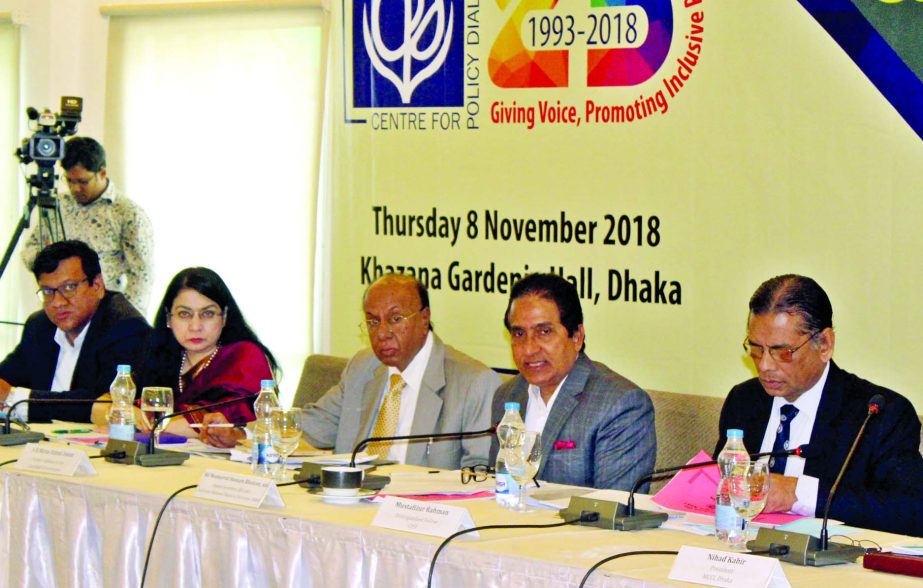
Economic Reporter :
Describing investment as a very important determiner of the economic growth, speakers at a discussion on development finance on Thursday lamented the ‘stagnancy’ in the country’s private sector investment.
They came up with the lamentation at the ‘Dialogue on Catalysing Development Finance for Bangladesh: Mobilisation and Utilisation Challenges’.
Centre for Policy Dialogue (CPD) organised the programme at a city hotel.
With CPD Distinguished Fellow Professor Mustafizur Rahman in the chair, the function was addressed, among others, by National Board of Revenue (NBR) Chairman Md Mosharraf Hossain Bhuiyan, International Monetary Fund (IMF) Resident Representative Ragnar Gudmundsson, CPD’s Distinguished Fellow Dr Debapriya Bhattacharya and Metropolitan Chamber of Commerce and Industry President Barrister Nihad Kabir.
CPD Executive Director Dr Fahmida Khatun and Senior Research Fellow Towfiqul Islam Khan made keynote presentations at the dialogue.
“Are we heading towards a labour-less and capital-less growth?” said former caretaker government adviser AB Mirza Azizul Islam in his speech at the dialogue.
He also questioned over 7 percent GDP growth, saying, “How is this possible whereas the private investment has been stagnant for the last one decade? This happened nowhere in the world except a country-Tanzania.”
Mentioning that the country’s private investment was 21.9 percent of the GDP in 2008-09 fiscal year, Mirza Azizul said it reached only 23.1 percent in 2017-18. “Whatever the investment increased, it came from the public sector and a major part of it was foreign-aided fund,” he said.
The former caretaker government’s finance adviser said unless there is ‘good governance and democracy’, it is impossible to mobilise fund from the internal sector.
He said the country severely lacks negotiation capacity in obtaining foreign aid for which many unnecessary projects are being taken with foreign assistance.
Mirza Azizul also observed that there is no mechanism to assess the impacts of foreign-aided projects on people.
Dr Debapriya Bhattacharya said it will not be wise to send out the idea that Bangladesh’s development is possible without foreign aid while globally the rate of foreign assistance is declining.
He mentioned that Bangladesh’s GDP-revenue ratio is the lowest in the Asia-Pacific region for lack of good governance in the tax administration.
The renowned economist said Bangladesh has been ustilising foreign aid mostly for infrastructure development while projects in the social sector like health and education is getting less attention.
NBR Chairman Mosharraf Hossain Bhuiyan admitted that despite having willingness, many people do not pay income tax as they fear taxmen and income tax lawyers. “They think once they pay tax, they’ll be harassed by the tax collectors,” he said.
He said although 35 lakh people have TINs across the country, only 20 lakh of them submit tax returns. “The government has been trying to boost the tax collection through different measures like organising tax fair.”
Describing investment as a very important determiner of the economic growth, speakers at a discussion on development finance on Thursday lamented the ‘stagnancy’ in the country’s private sector investment.
They came up with the lamentation at the ‘Dialogue on Catalysing Development Finance for Bangladesh: Mobilisation and Utilisation Challenges’.
Centre for Policy Dialogue (CPD) organised the programme at a city hotel.
With CPD Distinguished Fellow Professor Mustafizur Rahman in the chair, the function was addressed, among others, by National Board of Revenue (NBR) Chairman Md Mosharraf Hossain Bhuiyan, International Monetary Fund (IMF) Resident Representative Ragnar Gudmundsson, CPD’s Distinguished Fellow Dr Debapriya Bhattacharya and Metropolitan Chamber of Commerce and Industry President Barrister Nihad Kabir.
CPD Executive Director Dr Fahmida Khatun and Senior Research Fellow Towfiqul Islam Khan made keynote presentations at the dialogue.
“Are we heading towards a labour-less and capital-less growth?” said former caretaker government adviser AB Mirza Azizul Islam in his speech at the dialogue.
He also questioned over 7 percent GDP growth, saying, “How is this possible whereas the private investment has been stagnant for the last one decade? This happened nowhere in the world except a country-Tanzania.”
Mentioning that the country’s private investment was 21.9 percent of the GDP in 2008-09 fiscal year, Mirza Azizul said it reached only 23.1 percent in 2017-18. “Whatever the investment increased, it came from the public sector and a major part of it was foreign-aided fund,” he said.
The former caretaker government’s finance adviser said unless there is ‘good governance and democracy’, it is impossible to mobilise fund from the internal sector.
He said the country severely lacks negotiation capacity in obtaining foreign aid for which many unnecessary projects are being taken with foreign assistance.
Mirza Azizul also observed that there is no mechanism to assess the impacts of foreign-aided projects on people.
Dr Debapriya Bhattacharya said it will not be wise to send out the idea that Bangladesh’s development is possible without foreign aid while globally the rate of foreign assistance is declining.
He mentioned that Bangladesh’s GDP-revenue ratio is the lowest in the Asia-Pacific region for lack of good governance in the tax administration.
The renowned economist said Bangladesh has been ustilising foreign aid mostly for infrastructure development while projects in the social sector like health and education is getting less attention.
NBR Chairman Mosharraf Hossain Bhuiyan admitted that despite having willingness, many people do not pay income tax as they fear taxmen and income tax lawyers. “They think once they pay tax, they’ll be harassed by the tax collectors,” he said.
He said although 35 lakh people have TINs across the country, only 20 lakh of them submit tax returns. “The government has been trying to boost the tax collection through different measures like organising tax fair.”

